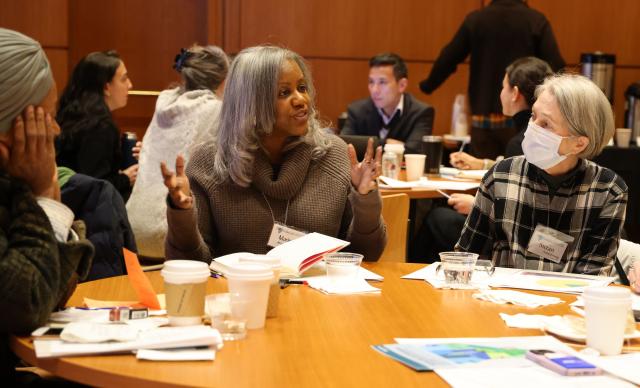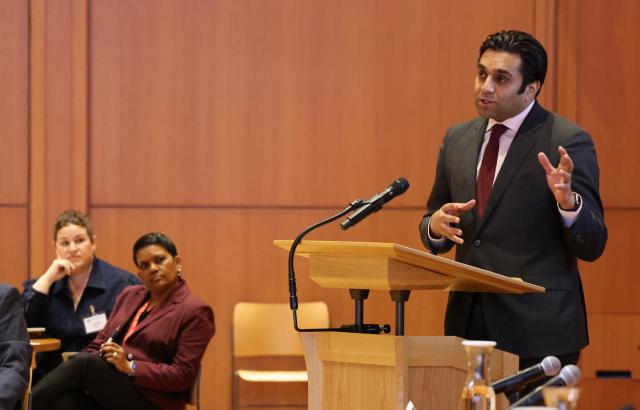Reframing Our Understanding of Food and Mental Health
Among the challenges faced by Lower Manhattan residents, community members named reliable access to food and mental health services as two of the most important. The arrival of the COVID-19 pandemic in March 2020 magnified both issues and demonstrated how closely they are intertwined.
On February 2, 2023, Neighborhood Support hosted a half-day symposium to delve deeper into the intersections between food insecurity, mental health, and well-being.
Background: Trends in food insecurity and mental health challenges in New York City
Citywide, data shows an increase in food insecurity between 2019 to 2020, from 12.5% in to 14.6%. Rates of food insecurity were starker for children, rising from 18.1% to 24.9%. Black and Latino households experienced food insecurity at rates two to four times higher than white households.1
Similarly, data from 2021 show that nearly one-fifth of New York City adults reported experiencing depression or anxiety.2 The most recent data from 2019 show one-third of youth grades 9-12 reported feeling depressed. Just under 10% of these youth had attempted suicide.3
Since the start of the pandemic, three of the most common risk factors for poor mental health outcomes included (1) death of someone close since January 2020; (2) overwhelming or above-average financial stress; and (3) lack of emotional support. The prevalence of these risk factors varied by race and ethnicity.2
Connecting the dots: The relationship between food insecurity and mental health
A growing body of research confirms the relationship between food insecurity and mental health observed by our partners in Lower Manhattan. Recently, a systematic review found a positive association between food security and mental well-being. Food insecurity is associated with:
- A 40% higher risk of depression
- A 34% higher risk of stress4
Furthermore, additional research suggests the relationship between food insecurity and poor mental well-being is bi-directional.5
- Among low-income families in NYC, parents who experienced food insecurity reported psychological distress 1.6 times more than those who did not.6
- Conversely, in a national sample of respondents during the COVID-19 pandemic, individuals who reported symptoms of depression and anxiety were more likely to face food insecurity.7
Reframing our understanding of food and mental health
Keynote speaker Dr. Gia Merlo, Professor of Psychiatry at NYU Grossman School of Medicine, opened the symposium by sharing how brain health, mental health, and wellness contribute to overall well-being. “Brain health” represents brain development and function, whereas “mental health” refers to a positive, resilient state of mind that allows one to “cope with the ordinary demands and stresses of life.” Mental illnesses may reflect less-than-optimal brain health, but people with these conditions can still achieve good mental health and overall well-being.
Lifestyle medicine—a holistic approach to a patient’s well-being—places mental health at the center and strives for balance across nutrition, exercise, relationships, substance use, stress management, and sleep using both lifestyle changes and clinical strategies.
As a key pillar of lifestyle medicine, nutrition is crucial for optimum mental health. In fact, the three most common mental health conditions (depression, anxiety, and ADHD) are the most impacted by diet. Unfortunately, people who are food insecure must often rely on less nutritious, ultra-processed foods that negatively affect mental health.
To compound this challenge, food insecurity often results from life shocks such as loss of job, income, or other household changes; food insecurity is, independently, its own trauma. Even when a household is no longer food insecure, the lasting effect of such stressors can serve as barriers to behavior change in nutrition, exercise, and other domains.
How can our community address the cycle of food insecurity and poor mental health?
Given the feedback loop of food insecurity and mental health, symposium participants discussed how policymakers and organizations providing food assistance can intervene. First, participants discussed the root causes of food insecurity and poor mental health.
Many people in our communities do not have enough money to make ends meet. Unemployment and low wages combined with the high costs of healthcare, childcare, and housing contribute to nutritional and mental health difficulties. Emergency funds are critical for families to address both. Unfortunately, accessing government benefits is cumbersome and non-governmental assistance programs are constantly at risk of losing resources.
Kate MacKenzie, the Executive Director for the Mayor’s Office of Food Policy, and Dr. Ashwin Vasan, Commissioner of the NYC Department of Health and Mental Hygiene (DOHMH), pointed to recent changes in New York City strategies to address the interwoven challenges of food security and mental health. MacKenzie noted that every City agency is now tasked with identifying its role in food security. Likewise, Vasan highlighted Mayor Eric Adam’s commitment to upstream investments in economic, social service, and healthcare systems that address the interrelated systems of wages, housing, healthcare, and childcare. These investments, hopefully, will result in long-term impacts.
What can be done now?
In the near term, our panelists who provide direct services recommended the following:
- Programs must be distributed appropriately in high-need neighborhoods—many communities do not have enough services to meet the needs of local residents.
- Services must be co-located: people who need help in one domain often need assistance in many other areas.
- Deep partnerships across care providers and assistance programs can strengthen continuity of care within and across the domains of nutrition, mental health, income and employment, childcare, and housing.
- Digital access to services through a centralized platform is one way to coordinate care, but an online platform cannot reach everyone who needs support.
- Last, and perhaps most importantly, our speakers highlighted the need for a person-centered approach within service organizations that addresses the needs of an individual or household. Tenets of such an approach include:
- Ensuring front-line staff have cultural and linguistic competency,
- Creating welcoming environments in which services are offered,
- Respecting personal preferences in terms of food choices, mental health services, and other supports, and
- Honoring the dignity of each person who seeks support.
1 Map the Meal Gap, county-level estimates of food insecurity, 2019 and 2020. Feeding America data request. Data received January 10, 2023.
2 Impacts of COVID-19 on Mental Health in New York City, 2021. New York City Department of Health and Mental Hygiene: Epi Data Brief (130); December 2021. https://www1.nyc.gov/assets/doh/downloads/pdf/epi/databrief130.pdf
3 Citizens’ Committee for Children Keeping Track Online database. Data Download, https://data.cccnewyork.org/data/download#0/0. Last accessed 9/19/2022. Prevalence of youth depression and youth suicide attempt (2019).
4 Ali Pourmotabbed A, Moradi S, Babei A, Ghavami A, Mohammadi H, Jalili C, Symonds ME, Miraghajani M. Food insecurity and mental health: a systematic review and meta-analysis. Public Health Nutrition, 23(10); March 16, 2020. https://www.cambridge.org/core/journals/public-health-nutrition/article/food-insecurity-and-mental-health-a-systematic-review-and-metaanalysis/CB76D90D879907A6050DCAE2AD4F07EE
5 Seligman HK, Berkowitz SA. Aligning programs and policies to support food security and public health goals in the United States. Annual Reviews of Public Health, 40; 2019. https://www.ncbi.nlm.nih.gov/pmc/articles/PMC6784838/
6 Neckerman K, Brooks-Gunn J, Eliason E, Gandhi J, Jia Y, Maury M, Waldfogel. Spotlight on mental health: Disparities in psychological distress among parents of young children in New York City. Poverty Tracker program, Robin Hood Foundation. March 2022. Last accessed 1/19/2023. https://www.robinhood.org/wp-content/themes/robinhood/images/poverty-tracker/pdfs/POVERTY_TRACKER_REPORT33.pdf
7 Fitzpatrick KM, Harris C, Drawve G, Willis DE. Assessing food insecurity among US adults during the COVID-19 pandemic. Journal of Hunger & Public Health Nutrition, 16(1); October 4, 2020.







